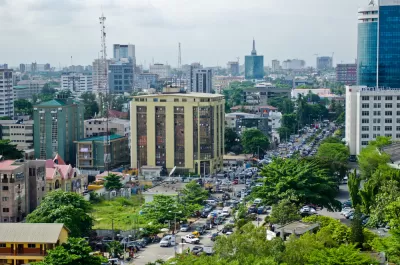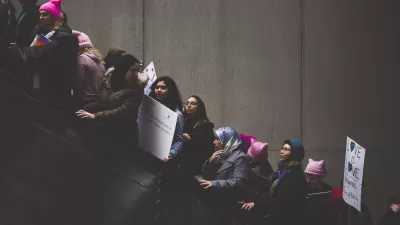Rising populations and political challenges complicate the future development of Africa's major metropolitan centers.

The traffic-choked streets of Lagos, Nigeria may be a harbinger of the future in the continent's major cities, many of which are experiencing explosive population growth and urbanization, in some cases with little comprehensive planning to mitigate the effects of unchecked growth. An article by Max Bearak, Dylan Moriarty, and Júlia Ledur describes the projected growth of five African cities, the legacy of colonial planning, and the lessons they hold for the future of the continent.
In Lagos, Nigeria, overcrowded housing conditions and inadequate infrastructure force many people to live in densely packed quarters lacking basic utilities. In countries like Sudan and Congo, war and other political crises push refugees into cities, creating a massive influx of people seeking safety and opportunities, exacerbating poverty in urban centers.
Meanwhile, China is gaining influence in African nations as it provides government-backed loans to support infrastructure projects in cities such as Djibouti, Luanda, Angola, and Lubumbashi, Congo. Overall, "Chinese institutions invested more than $200 billion in the transportation and power sectors across Africa between 2000 and 2017, according to the AidData initiative at William & Mary, the Virginia college."
Highlighting the urgency of the need for improved infrastructure and institutional reform, the article notes that "Several recent studies project that by the end of this century, Africa will be the only continent experiencing population growth. Thirteen of the world’s 20 biggest urban areas will be in Africa — up from just two today — as will more than a third of the world’s population."
FULL STORY: AFRICA’S RISING CITIES

Planetizen Federal Action Tracker
A weekly monitor of how Trump’s orders and actions are impacting planners and planning in America.

Congressman Proposes Bill to Rename DC Metro “Trump Train”
The Make Autorail Great Again Act would withhold federal funding to the system until the Washington Metropolitan Area Transit Authority (WMATA), rebrands as the Washington Metropolitan Authority for Greater Access (WMAGA).

The Simple Legislative Tool Transforming Vacant Downtowns
In California, Michigan and Georgia, an easy win is bringing dollars — and delight — back to city centers.

The States Losing Rural Delivery Rooms at an Alarming Pace
In some states, as few as 9% of rural hospitals still deliver babies. As a result, rising pre-term births, no adequate pre-term care and harrowing close calls are a growing reality.

The Small South Asian Republic Going all in on EVs
Thanks to one simple policy change less than five years ago, 65% of new cars in this Himalayan country are now electric.

DC Backpedals on Bike Lane Protection, Swaps Barriers for Paint
Citing aesthetic concerns, the city is removing the concrete barriers and flexposts that once separated Arizona Avenue cyclists from motor vehicles.
Urban Design for Planners 1: Software Tools
This six-course series explores essential urban design concepts using open source software and equips planners with the tools they need to participate fully in the urban design process.
Planning for Universal Design
Learn the tools for implementing Universal Design in planning regulations.
Smith Gee Studio
City of Charlotte
City of Camden Redevelopment Agency
City of Astoria
Transportation Research & Education Center (TREC) at Portland State University
US High Speed Rail Association
City of Camden Redevelopment Agency
Municipality of Princeton (NJ)



























